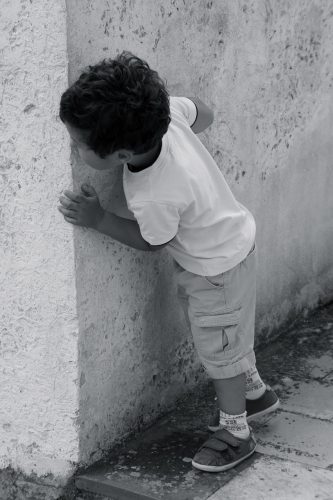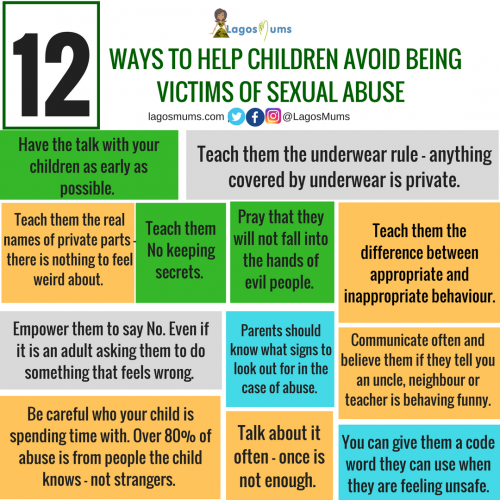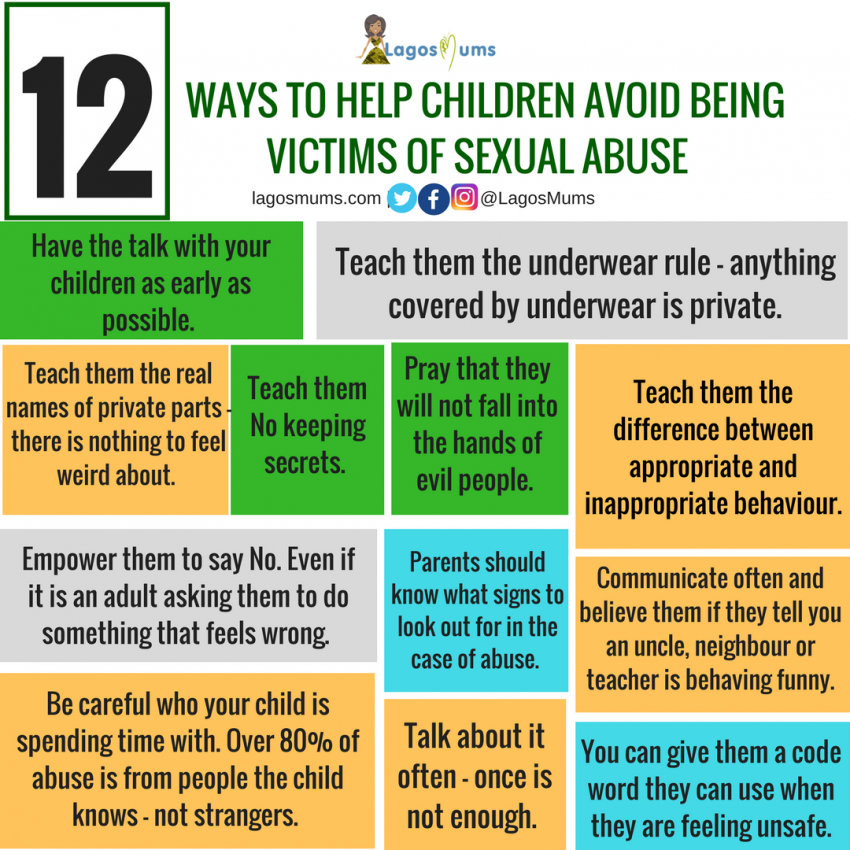There are several ways to teach your child how to prevent sexual abuse, and at the core of it is the understanding that knowledge is power.
It can happen to children of any age. For example, Guardian news reported the ongoing court case over child defilement against a supervisor of Chrisland School Lagos. In this case, it was a 2-year-old pupil of Chrisland School, Lekki, Lagos. The video recording depicted the child in the Clinical Psychologist’s office on November 28, 2016 answering questions about the alleged defilement.
The 2 year old recounted how Adegboyega put his hand and his “wee wee” in her “wee wee”. Using a teddy bear, she was able to show how the supervisor allegedly sexually abused her friend.
Sadly, news like this is not totally uncommon and some don’t make it to the authorities, which is quite disheartening. Instead of just expressing anger and shock, we can use this to learn about how to protect our children from sexual abuse. The best way to avoid such is to teach and empower your child on how to prevent sexual abuse.
The best way to avoid such abuse is to teach and empower your child on how to prevent sexual abuse. Share on X

Ways To Teach Your Child How To Prevent Sexual Abuse
Have “the talk” with them
Do not assume that your child is too small to be spoken to. You’ll agree with me that children these days learn fast and are more observant.
You don’t have to tell them all the details about sexual activity, keep it simple and age-appropriate. Ease into it by explaining how certain parts of their body, those covered by underwear, are private.
No one should touch them there except for Mommy and Daddy (or primary caregiver) when they’re being cleaned—and the doctor, too, but only if Mom or Dad is there in the room. Focus on telling them about appropriate and inappropriate behaviour. (What is inappropriate behavior?)
Teach them Body Parts
Name body parts and talk about them very early. Use real names about body parts. When you use weird or made up names, “It makes children think that there is something weird or shameful about their bodies, and they’ll be less likely to tell you if someone touches them,” says Sharon W. Doty, author of Keeping Them Safe: Protecting Children from Sexual Predators and Evil in Our Midst: Protecting Children from Sexual Predators.
Feeling comfortable using correct words and knowing what they mean can help a child talk clearly if something inappropriate has happened. Teach them that some parts of the body are private and they are not for everybody to see or touch. Tell your child matter-of-factly that no one should touch their private parts and that no one should ask them to touch somebody else’s private parts. Teach them Body Boundaries. (How to protect your children with the underwear rule)
Emphasize on ” NO KEEPING SECRETS”
Adults should never make a child keep a secret that makes them feel worried, sad or frightened. Secrets are often an abuser’s greatest weapon.
Tell your children that no matter what anyone tells them, no matter how fun it may seem, secrets are not okay. They should always tell you if someone tries to make them keep a secret.
Remind your child frequently that no adult should ever ask her to keep secrets. And that includes you. If you’re keeping secrets with your child, it will confuse them. Assure them that you won’t punish them and you will believe them if they come to you to report.
Has your child ever told you that a particular uncle, cousin or aunty is acting in a funny way towards them? Or that they’re using inappropriate language or even making passes at them? Did you believe them? Or did you dismiss them because you think “Tade is not like that?”

Don’t be too trusting but don”t be too paranoid
We usually tell our children to beware of strangers which is good advice. However, the truth is, 80 to 90 per cent of abuse is committed not by strangers but by someone the child knows well—and possibly loves.
According to the US Department of Justice, only 10% of perpetrators were strangers and 23% of the perpetrators were children themselves.
You have to be careful about who your child spends time with on a daily basis. We hear stories daily. You never can tell if the next paedophile is an uncle, aunty, lesson teacher or household staff. Where are they going for a sleepover? Do they play at the neighbours’ house? Are they safe in school? Are you leaving your girl child alone with the driver or other males? This is why your children should know the difference between appropriate and inappropriate behaviour.
“My brother-in-law Harry was touching his eleven-year-old daughter. She was clearly uncomfortable with his attention. ‘Don’t worry about it,’ I told her. ‘Your dad doesn’t mean anything by it.’ I wish I had told Harry, in front of my niece, ‘I see Janice is uncomfortable. You should stop touching her like that.’ This would let my niece know that it is okay to say ‘no’ to him. It would let Harry know that someone is watching and noticing and not afraid to speak up.” Aunt of a child who was abused.
It’s okay to say “NO”
Children are often taught to be respectful and always obey elders or people they like. However, we need to also let them know that it is okay to say no if they feel uncomfortable. Additionally, stop insisting that they hug an aunt or uncle.
Children are often taught to be respectful and always obey elders or people they like. However, we need to also let them know that it is okay to say no if they feel uncomfortable. Share on X
If someone is asking them to do something they know is wrong or feel is wrong, they can say no. If someone wants to touch or see their private parts, they should say no. Spell it out for them and tell them what to do when they find themselves in situations that they are not comfortable in. For example “say you want to go, say you need to leave to use the toilet, don’t keep quiet, say you never keep secrets from your parents no matter how much trouble you might be in and you’ll report”
Have a code word your children can use when they feel unsafe or want to be picked up
As children get a little bit older, you can give them a code word that they can use when they are feeling unsafe which can be used at home or when there are guests in the house. This code could be especially helpful when they are on a playdate or a sleepover.
We know these discussions might not absolutely prevent sexual abuse, but knowledge is a powerful deterrent. This is especially true with young children who are targeted due to their innocence and ignorance in this area.
One discussion is not enough. Find natural times to repeat these messages, such as bath time or when they are running around naked. And please share this article with those you love and care about.
There are so many ways parents could protect their children if we just knew how. Some children who have experienced sexual abuse may be too frightened to tell anyone, but there are physical and behavioural signs. It’s important for parents to recognise the warning signs of child sexual abuse so that they can respond and intervene as quickly as possible.



